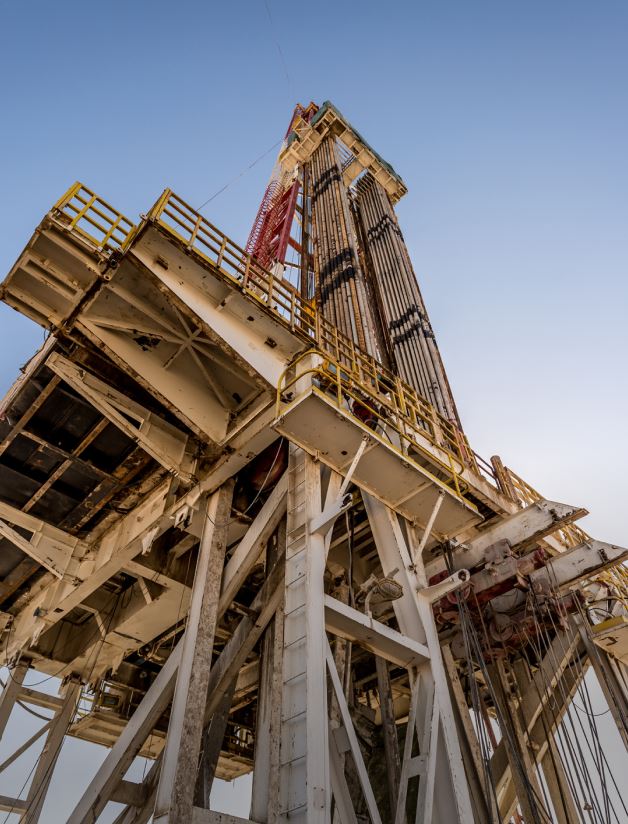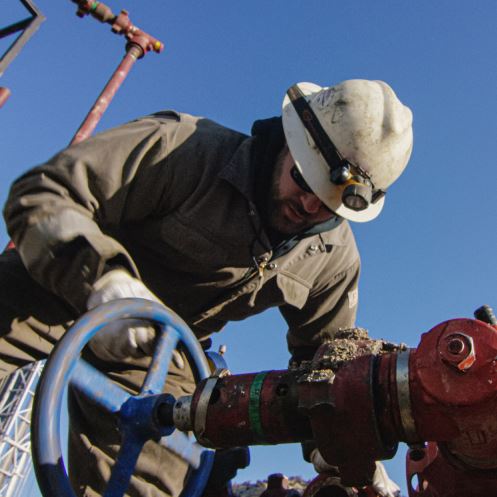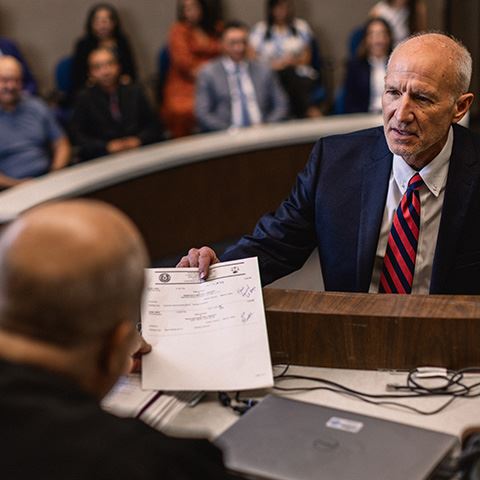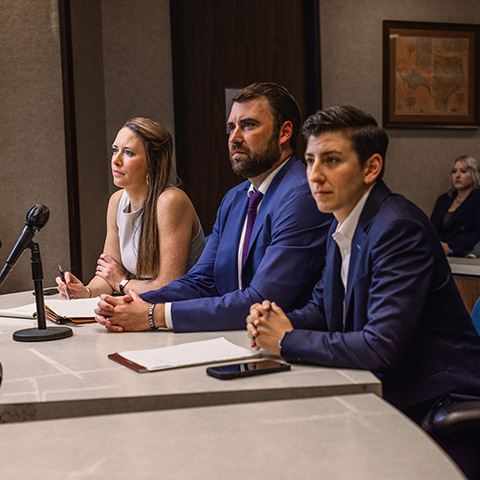Oilfield Injury Workers' Comp Claims in Texas
Can a Lawyer Help Me With Workers' Compensation Claims After an Oilfield Injury in Texas?
At Hilliard Law, we understand the challenges of understanding workers' compensation claims after an oilfield injury in Texas. Our dedicated team is here to guide you through the process, ensuring you receive the support and compensation you deserve. From filing paperwork to negotiating with insurance companies, we'll advocate for your rights every step of the way. With our deep knowledge of Texas workers' compensation laws, you can trust us to fight for the best possible outcome for your case. Let us handle the legal difficulties so you can focus on your recovery.
If you’ve been injured while working in the Texas oilfields, the process of claiming workers’ compensation can seem overwhelming. A seasoned lawyer can be your guide, providing clarity and direction through the intricate legal processes. They can help you understand your rights, gather essential documentation, and represent you in negotiations with insurance companies, ensuring you receive the full benefits you’re entitled to.
For example, if your claim is unfairly denied or you’re offered a settlement that doesn’t cover all your medical expenses and lost wages, a lawyer can challenge these decisions and advocate on your behalf.
At Hilliard Law, we understand the stakes are high, and we’re committed to fighting for the compensation you need to support your recovery and your family. Our dedicated team is ready to analyze your case, guide you through each step, and help you secure the justice and compensation you deserve.
Call us at (866) 927-3420 for a free consultation, and let our experience in workers’ compensation claims be the support you need during this challenging time.


Common Oilfield Injuries and Their Impact
The oil and gas industry, while lucrative, is fraught with risks that can lead to a variety of injuries. At Hilliard Law, we’re all too familiar with the common oilfield injuries that can have life-altering consequences for workers and their families. These injuries are not just statistics; they’re personal stories of pain and resilience, and they drive our commitment to securing justice for every client we represent.
From severe burns and fractures to traumatic brain injuries and chemical exposure, the physical toll of oilfield injuries is extensive. These injuries can range from those requiring simple medical interventions to catastrophic events necessitating long-term care, such as spinal cord injuries leading to paralysis. Understanding their impact is crucial in appreciating the full scope of compensation necessary for recovery.
Physical Toll of Oilfield Injuries
The physical toll of common oilfield injuries cannot be overstated.
- Burns: From minor to severe, burns can occur due to fires, explosions, or contact with hot surfaces or fluids.
- Fractures: Broken bones are common in oilfield accidents, often resulting from falls, being struck by heavy equipment, or vehicular collisions on site.
- Traumatic Brain Injuries (TBIs): These can range from concussions to more severe brain damage and can be caused by falls, blows to the head, or being near an explosion.
- Spinal Cord Injuries: These devastating injuries can result from falls, being struck by objects, or vehicle accidents, leading to temporary or permanent paralysis.
- Amputations: Loss of limbs or digits can occur due to entanglement in machinery or as a result of severe trauma.
- Hearing Loss: Prolonged exposure to loud noise or a single event of acoustic trauma can lead to temporary or permanent hearing impairment.
- Chemical Exposure: Contact with hazardous chemicals can cause burns, respiratory problems, and other long-term health issues.
- Musculoskeletal Injuries: Strains, sprains, and tears from lifting, slipping, or repetitive motion are common and can lead to chronic pain and disability.
- Crush Injuries: Occur when a body part is trapped between objects or machinery, leading to serious damage to muscles, blood vessels, and bones.
Traumatic brain injuries, for instance, can disrupt every facet of a person’s life, sometimes leading to permanent disability or chronic conditions that require lifelong care. Spinal cord injuries, another devastating outcome, can mean a future of navigating the world in an entirely different way, possibly without the ability to walk.
Soft tissue damage, including extensive neck and back injuries, is also prevalent among oilfield workers, often resulting in a need for surgical intervention and prolonged rehabilitation. These injuries not only cause immediate physical pain but also pose the risk of long-term mobility issues, fundamentally altering the course of a worker’s life and livelihood.
Emotional and Financial Strain
The repercussions of an oilfield injury extend far beyond the physical. The emotional and psychological distress that accompanies such trauma can manifest as anxiety, depression, or even PTSD, creating an invisible burden that weighs heavily on injured workers. These psychological scars can be as debilitating as the physical ones, impacting relationships, mental health, and overall quality of life.
The financial strain is equally pressing. Medical bills pile up, the ability to work decreases, and families find themselves with a loss of income at a time when financial demands are at their peak. It’s a domino effect that can lead to hardship and uncertainty. At Hilliard Law, we are aware of these pressures and diligently strive to secure compensation. This compensation encompasses not only immediate medical costs but also addresses all of your needs, allowing you and your family to concentrate on the recovery process.
Workers' Compensation for Oilfield Injuries in Texas
Understanding your rights after an oilfield injury in Texas can be difficult. At Hilliard Law, we’re here to make it easier for you, helping you every step of the way. In the oil and gas industry, where risks are part of the job, being informed is your best defense.
While Texas doesn’t mandate private companies to carry workers’ compensation insurance, many oil and gas companies opt to provide this safeguard for their employees.
This decision is often driven by the inherently risky nature of the industry, where the likelihood of workplace injuries is higher. By offering workers’ compensation, companies aim to protect their workforce and mitigate potential financial losses from injury-related lawsuits. Additionally, having a workers’ compensation policy can be a strategic move to attract and retain skilled employees who seek job security in the form of comprehensive benefits. It also reflects positively on the company’s commitment to employee welfare, potentially enhancing the company’s reputation in a competitive market.
If you’re an injured oilfield worker covered by such insurance, you may qualify for benefits:
- Impairment Income Benefits (IIBs): A form of compensation provided to workers who have sustained a permanent impairment due to a work-related injury. For example, if a worker suffers hearing loss due to prolonged exposure to loud machinery, IIBs would help cover the loss of earning capacity resulting from the injury.
- Temporary Income Benefits (TIBs): These benefits are like a financial band-aid, designed to partially replace lost wages when an injured worker is temporarily sidelined due to a work-related injury. For instance, if an oilfield technician is recovering from a mishap with heavy machinery and can’t clock in, TIBs help keep the lights on at home during the healing hiatus.
These comprehensive benefits are designed to address every aspect of your situation following an oilfield injury, which is crucial for your recovery.
The Claims Process
The moment an oilfield accident occurs, the clock starts ticking on your opportunity to seek compensation. Following an injury, it’s vital to report the incident within the critical 30-day period to ensure your claim is timely. This initial step is more than just procedural; it’s about documenting the crucial details that will become the bedrock of your claim.
Being actively involved in the investigation is crucial because it helps establish the foundation of your case. The story of the accident, as you describe it and as supported by evidence, will be key to advancing your compensation claim. At Hilliard Law, we guide you through every step of this process, ensuring no stone is left unturned in the pursuit of the compensation you deserve:
- Reporting the Injury: Notify your employer immediately after the accident to create an official record.
- Seeking Medical Attention: Obtain medical care to address your injuries and document their extent and severity.
- Documentation: Gather all necessary documentation, such as medical records, incident reports, and any witness statements.
- Filing the Claim: Submit a workers’ compensation claim with your employer’s insurance carrier.
- Case Evaluation: Have your case assessed by a legal professional to understand its merits and the compensation you may be entitled to.
- Investigation: Participate in a thorough investigation to collect evidence and establish the facts of the incident.
- Legal Representation: Engage an experienced lawyer to guide you through the legal process and advocate on your behalf.
- Negotiation: Your lawyer will negotiate with the insurance company to reach a fair settlement for your claim.
- Appeals Process: If necessary, your lawyer will help you navigate through any appeals due to denials or insufficient settlement offers.
- Settlement or Trial: Reach a final settlement or, if necessary, take the case to trial to seek the compensation you deserve.
Challenges You May Face
In the oilfield disputes over the severity of injuries are common, and they can complicate your workers’ compensation claim. It’s not unusual for workers to encounter claim denials, rooted in disagreements about whether the injury is work-related or the extent of the disability. For instance, a worker might be denied benefits because their hearing loss was due to non-work-related activities, despite having worked for years in a high-decibel environment. These hurdles can make an already distressing situation feel insurmountable.
When you’re up against such challenges, the appeals process can feel like an overly complex and intimidating journey. This is where Hilliard Law can make a significant difference. Our experienced oilfield injury lawyers handle appeals with ease, turning what may appear as dead-ends into avenues of opportunity for your claim.
The Role of an Experienced Oilfield Injury Lawyer
At Hilliard Law, we’ve carved a niche in this domain, offering legal advice sharpened by years of advocating for oil and gas workers’ rights. Our oilfield injury attorneys are not just your representatives; they’re your allies, committed to demystifying the legal proceedings and ensuring your voice is heard loud and clear.
We understand the intricacies of oilfield work hazards and the regulations that govern them, providing legal guidance that is both comprehensive and tailored to the unique challenges of your case. With a steadfast commitment to your best interests, we offer ongoing support and diligence, handling each case with a strategy designed to secure the justice you seek.
Assessing Your Case
At Hilliard Law, we dig deep to uncover every relevant fact and piece of evidence that can fortify your claim. It’s a meticulous process that involves analyzing the accident scene, assessing damages, and understanding the full impact of your injuries on your life.
Our legal guidance is rooted in a comprehensive understanding of the nuances of oilfield accidents, from multiple liable parties to complicated regulations and insurance company tactics. With Hilliard Law, you can be assured that every aspect of your case is being evaluated through a lens of years of experience, setting the stage for the strongest possible legal strategy.
Advocating for Your Rights
Once your case is assessed, the next phase is advocacy—a hallmark of our approach at Hilliard Law. Our experienced oilfield injury lawyers are tenacious negotiators, adept at handling discussions with insurance companies to ensure that your story isn’t just heard, but also resonates with those who control your financial recovery.
In instances where negotiations fall short, we are prepared to transition from the boardroom to the courtroom, defending your rights fiercely in a legal setting. Whether it’s securing a fair settlement or taking your case before a judge, we stand unwavering in our commitment to fight for the compensation you deserve, including seeking compensation through legal means.
Maximizing Your Benefits
Securing maximum compensation for your oilfield injuries is not just a goal at Hilliard Law—it’s a commitment. We employ strategic tactics, from gathering compelling evidence to countering opposition claims, all aimed at ensuring you receive the full compensation available to you.
Should your case require it, we leverage our courtroom experience to advocate for the full measure of your damages. Our track record speaks volumes, with victims of oilfield accidents consistently exploring compensation options with us that cover:
- Medical expenses
- Loss of income
- Pain and suffering
- Emotional distress
- Property damage
With Hilliard Law Firm, you’re not just hiring a lawyer; you’re enlisting a powerhouse dedicated to maximizing your benefits.
Identifying Responsible Parties
Determining accountability after an oilfield accident is difficult. Often, there could be multiple potentially responsible parties, including:
- Employers
- Contractors
- Equipment manufacturers
- Other third-party entities
At Hilliard Law, we don’t shy away from this complexity; we embrace it as an opportunity to broaden the scope of your claim.
Our rigorous investigations are designed to peel back the layers of each case, analyzing factors such as equipment failure, safety violations, and human error to pinpoint the sources of liability. In doing so, we ensure that all parties who contributed to your injury are held accountable, maximizing the potential for your recovery.
Proving Negligence
Proving negligence is a critical component of a personal injury lawsuit, and it requires evidence and legal skills. At Hilliard Law, we gather all necessary documentation, from incident reports to medical records, ensuring that the narrative of your accident is supported by indisputable facts, and helping you build a strong personal injury claim.
In addition to your evidence, we often draw on official investigations from agencies such as OSHA, which provide valuable insights into the contributing factors of your accident. For instance, if OSHA cites a violation of safety protocols, this can be a powerful piece of evidence to support your claim. Expert testimony also plays a pivotal role, and our attorneys are skilled in securing the right experts to substantiate claims of negligence, giving your case the weight it needs to succeed.
Calculating Damages
Calculating the full extent of damages in an oilfield injury lawsuit is complicated and includes more than your medical bills. At Hilliard Law, we take a holistic approach, assessing the severity of the injury, the total medical costs incurred, and the profound impact the injury has on your ability to earn an income.
We also account for the less tangible, yet equally critical, non-economic losses such as:
- Pain and Suffering
- Emotional Distress
- Loss of Enjoyment of Life
- Loss of Consortium
These damages, though not reflected on a receipt, are very real and can be just as debilitating as the physical injuries you’ve endured. Our goal is to ensure that the compensation you receive is comprehensive, truly reflecting the totality of your losses.
Your Legal Timeline: Understanding the Statute of Limitations
Time is of the essence when it comes to legal claims for oilfield injuries. In Texas, the statute of limitations for personal injury claims is two years from the date of the accident. Missing this critical deadline means forfeiting your right to pursue compensation, no matter the severity of your injuries.
At Hilliard Law, we ensure that our clients are informed of this legal timeline and take timely action to protect their rights. The statute of limitations is a fundamental aspect of the legal system, and understanding it is key to ensuring that the window of opportunity for justice does not close on you.
Choose Us for Your Oilfield Injury Claim
If you or a loved one has suffered an oilfield injury, reach out to Hilliard Law by calling (866) 927-3420 for a free, no-obligation consultation. During this consultation, we will provide you with legal guidance tailored to your unique situation, helping you understand the compensation to which you may be entitled.
This initial conversation is an opportunity for you to explore your options and for us to show you how we can assist in securing the fair compensation you deserve. There’s no pressure, just a chance for you to start regaining control over your future after an oilfield accident.
Contact us today, and let us be your advocates in this crucial time.
FREQUENTLY ASKED QUESTIONS real questions. Real answers.
-
What Are the Rights of Injured Employees in Texas?
In Texas, injured employees have the right to free assistance from the Office of Injured Employee Counsel, which is offered at local offices across the state, providing workers’ compensation system services from the Texas Department of Insurance.
-
What if My Employer Doesn’t Have Workers’ Compensation Insurance?
If your employer does not carry workers’ compensation insurance, you may have the right to file a personal injury lawsuit against them. This could potentially lead to a recovery of a wider range of damages than those typically available through workers’ compensation, such as pain and suffering and full wage replacement.
-
How Long Do I Have to File a Workers’ Compensation Claim in Texas?
You must report your injury to your employer within 30 days of the accident or from the time you knew your injury was related to your work. Additionally, you have one year from the date of the injury to file a claim with the Texas Department of Insurance, Division of Workers’ Compensation.
-
Can I Still File for Workers’ Compensation if I Am at Fault for the Oilfield Accident?
In Texas, workers’ compensation operates under a no-fault system. This means that you are generally eligible to file for workers’ compensation benefits regardless of who was at fault for the accident. There are some exceptions, however, such as if the injury was self-inflicted, or if you were under the influence of drugs or alcohol at the time of the accident.
-
What Should I Do if I’m Having Trouble Getting My Workers’ Compensation Benefits?
If you’re experiencing difficulties in receiving your workers’ compensation benefits, it’s important to seek legal assistance. At Hilliard Law, we can help you navigate the intricacies of the claims process, communicate with the insurance company on your behalf, and represent you in any disputes or appeals. Our goal is to ensure that you receive the full benefits you are entitled to without unnecessary delays.



Real Results ReaL Justice
-
$33Work Injury
Million AwardWith the representation of Hilliard Law, two delivery drivers who were shot while completing a delivery were awarded $33 million through an arbitration panel.
-
$25Negligent Security
Million VerdictIn May 2013, Mr. Hilliard was the lead trial attorney who obtained a $25 million jury verdict in a premises liability case in Nueces County, Texas. His client, a security guard for a downtown Corpus Christi building, was severely beaten while at work.
-
$18Wrongful Death
Million Verdict*After only 3 days of trial, a San Patricio County, Texas jury returned a returned a record-breaking $18 million verdict, including $10 million in punitive damages, on behalf of our client, the widow of a trucker and handyman, who died after falling through a roof.
-
$13Catastrophic Injury
Million SettlementHilliard Law attorneys won a $13M settlement for a crane truck operator who was paralyzed in a workplace accident.
-
$11.5Catastrophic Injury
Million SettlementHilliard Law attorneys achieved a $11.5M settlement for a man who sustained burn injuries in a workplace accident.
-
$10Catastrophic Injury
Million SettlementWhile working at a chemical facility, our client was instructed by the owner to climb to the top of a vessel to install spacers on a pipe when he was suddenly and without warning exposed to high concentrations of deadly chemical gases, including carbon monoxide, nitrogen, hydrogen, and hydrogen sulfide.
Beyond Workers' Comp: Exploring Personal Injury Lawsuits
Workers’ compensation is often the first avenue explored after an oilfield injury, but it’s not the only path to justice. At Hilliard Law, we know when to look beyond and evaluate whether pursuing a personal injury lawsuit is in your best interest. In some instances, third parties such as subcontractors or equipment manufacturers may be involved in your oilfield injury. This involvement allows you to seek damages beyond the boundaries of workers’ compensation.
For example, if an oilfield worker is injured due to a defective piece of equipment, a workers’ compensation claim would typically cover medical expenses and a portion of lost wages. However, in such a scenario, a personal injury lawsuit against the equipment manufacturer could potentially yield a more comprehensive compensation package, including damages for pain and suffering, full wage replacement, and punitive damages, if the manufacturer’s negligence in producing a faulty product can be proven.
Such a step may be necessary if your employer does not carry workers’ compensation insurance, or if negligence played a role in your injury. Our comprehensive legal approach encompasses the identification of these opportunities, ensuring a thorough pursuit of fair compensation.
The Basics of Workers' Compensation in Texas
Workers’ compensation is a safety net, designed to help you with financial and medical benefits when the risks of the oilfield become reality. These benefits include coverage for the medical expenses that can quickly mount following an oilfield injury, ensuring that your path to recovery isn’t hindered by the cost of care.
But it’s not just the immediate medical bills that workers’ compensation addresses. For many injured workers, the loss of income during recovery can be just as devastating as the injury itself. That’s why Texas workers’ compensation steps in to help:
- Medical Expenses: Coverage for hospital stays, medical treatments, surgeries, medications, and any necessary medical equipment.
- Rehabilitation Costs: Financial support for physical therapy, occupational therapy, and other forms of rehabilitation essential for recovery.
- Lost Wages: Compensation for the income lost during the time the injured worker is unable to work.
- Disability Benefits: Payments made to workers who suffer temporary or permanent disabilities due to their injuries.
- Death Benefits: Financial assistance provided to the dependents of a worker who dies as a result of an oilfield injury.
- Vocational Rehabilitation Services: Support for retraining or skill development if the injured worker cannot return to their previous job due to their injuries.
- Travel Expenses: Reimbursement for travel to and from medical appointments related to the work injury.
- Legal Costs: Coverage for legal fees if representation is needed to secure workers’ compensation benefits.
Having Hilliard Law on your team means you’re equipped with the confidence and knowledge of the workers’ compensation system. This list is an overview, and the specifics will depend on the company’s workers’ compensation coverage. Hilliard Law can help you understand the nuances of your particular coverage and claim what is rightfully yours.



It’s our mission to hold the powerful accountable for their wrongdoing. Reach out to our team immediately regarding your case to schedule a free attorney consultation today.


